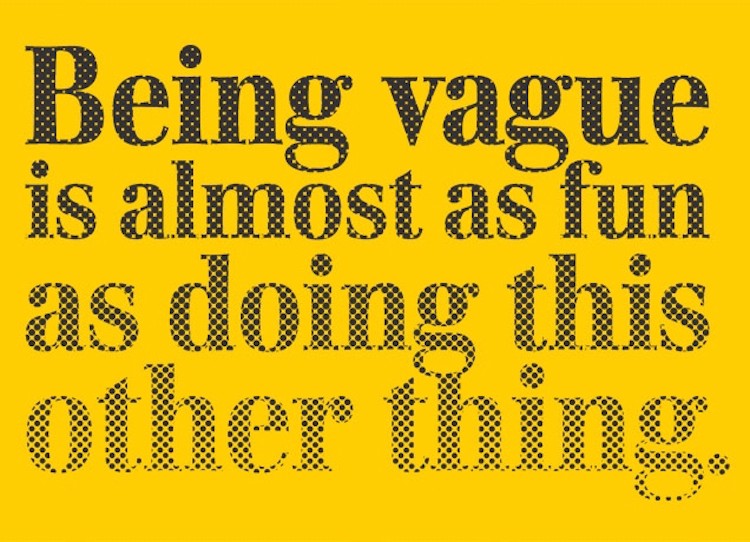SMART Goals, VAGUE Dreams

I did a little research on SMART goals. Seems even the proponents themselves cannot agree, and often cannot articulate the concept in a useful way. Take this from teachingteacher. For the "S" part they state: A general goal would be, 'Get in shape.' But a specific goal would say, 'Join a health club and workout 3 days a week.' They miss the most important point in both cases. There is no purpose to either of these goals. But on balance, I'd say that the former, more general, goal is the better goal because it leads you to ask a "why" question. The latter being entirely task-focused completely by-passes purpose. And this is how we work in corporations, day after day. We do what we are told, or what we are tricked into thinking is a task we set for ourselves. Task after task, with no sense of purpose, except the purpose of keeping our job and/or getting promoted. And we wonder why there's so little engagement in our corporations.
For "M" we hear this from sbinformation: "A goal without a measurable outcome is like a sports competition without a scoreboard or scorekeeper." Yes. So what? Business isn't sport. Building software is not a competition. Peddlers of management methodologies — the experts of quick fixes — churn out this trite nonsense as if it is wisdom. And we buy it. We'd be well to listen to some real wisdom on measurement, from Eli Goldratt: "Tell me how you measure me, and I will tell you how I will behave. If you measure me in an illogical way, do not complain about illogical behavior." We measure so we can manage. I'd argue that we need to stop managing, and start releasing, as in letting go.
For "A" projectsmart offer 'agreed upon' instead of 'attainable', suggesting that we get "agreement with all the stakeholders what the goals should be." Good luck with that. Agreement is a dangerous thing. The more power a person has, the more easily they can get someone to 'agree' with them. And what if we don't agree? I'll leave you to play that scenario forward for yourself.
For "R" Accipio (and others) advise constraint "...within the availability of resources, knowledge and time". Does anyone else see that this approach to action might be why there is so little true innovation in our industry? Setting only goals you know you can achieve is a very sad existence. Where's the challenge? Where's the threat? Where's the failure...where's the learning? Do what you know. Be safe. Pick up your paycheck.
And finally, "T". I'll pick on projectsmart again: "Enough time to achieve the goal. Not too much time, which can affect project performance." In other words, estimate accurately—even exactly—ahead of actually doing any of the work. This advice can only come from someone who's had his head buried in the sand for the past three decades. We don't know how long something complex is going to take until we do it, or at least begin to do it and reflect. Again, this limits our goals to only the things we know for sure we can do. I'll offer a ray of hope for SMART from topachievement: 'T can also stand for Tangible — A goal is tangible when you can experience it with one of the senses, that is, taste, touch, smell, sight or hearing." They spoil this lovely metaphor with their next sentence, but I'll spare you that. Just enjoy this imagery.
So now what? It's all very well to criticize, but what should we do instead? I believe this: we should stop setting goals and start imagining possibilities. Goals are manageable, possibilities can only be nurtured, and guided. And I'm a proponent of the nurture approach to business. As an alternative to SMART goals I'll offer VAGUE dreams: valuable, anarchic, genuine, unbounded, engaging.

Valuable In everything we undertake we must have a sense of the value it will provide to self, others or the world. We need purpose to make our work meaningful.
Anarchic Stop playing safe. Challenge, confront, undermine the current status quo. Strive to discover the undiscoverable.
Genuine Be true to yourself — abandon agreement in favor of passion, and then seek alignment. Don't compromise.
Unbounded Embrace not-knowing. Avoid forcing your ideas into someone else's box. Let your possibilities grow wings, and soar.
Engaging Keep your dreams vital, avoid repetition, continuously challenge yourself and those around you. Walk the edge.
If you are not quite ready to let go of goals and embrace dreaming, take a look at Forget SMART goals, try CLEAR goals — a good critique, and a less drastic step away from the dark side, and into the light.
Palo Alto, 10/04/2015 comment
